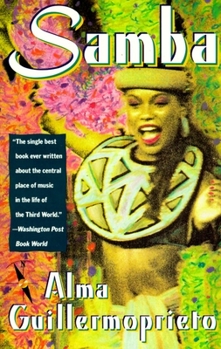Samba
Select Format
Select Condition 
Book Overview
For one year, Alma Guillermoprieto lived in Manguiera, a village near Rio de Janeiro, to learn the ritual of samba--the sensuous song and dance marked by a rapturous beat--and to take part in Rio's renowned carnivale parade.
Format:Paperback
Language:English
ISBN:067973256X
ISBN13:9780679732563
Release Date:July 1991
Publisher:Vintage
Length:256 Pages
Weight:0.50 lbs.
Dimensions:0.6" x 5.2" x 8.0"
Customer Reviews
5 ratings
An Essential Background Into Samba
Published by Thriftbooks.com User , 21 years ago
If you are interested in learning the true roots of Samba and Brazilian Carnaval(and not just the obligatory blurbs that you see in guidebooks), then this book is an absolute must for you to read. Alma Guillermoprieto does a superb job describing the rich religious, historical, and socioeconomic roots of Brazilian Carnaval and Samba - both of which have become famous around the world, yet remain remarkably poorly understood. Guillermoprieto writes in a very engaging, enjoyable style, which occassionally seems more like an engrossing novel than a non-fiction work. If you have ever been curious to learn more about Brazilian culture, this is the book to start with!
A Social History of Black Brazil
Published by Thriftbooks.com User , 22 years ago
Guillermoprieto is both a skilled writer and a serious scholar. That combination makes this erudite, and exceedingly detailed study of the black underclass in Brazilian society both readable and engaging. She employs an inductive approach, using the culture surrounding the Samba and Carnival in Rio as a base for exploring the status of blacks in Brazilian society and the many contradictions and ironies in light of their prevailing influence in all levels of Brazilian culture.The story is fascinating and the author admirable, because in order to learn and effectively represent the culture of the Samba and black Brazilian society (which she pretty effectively demonstrates are in many ways largely synonymous) she not only joined a Samba club in order to participate in Carnival, but also moved into the favelas of Rio.Guillermoprieto depicts the injustice of the blacks' fate in Brazil in a dispassionate, yet also very poignant and sympathetic manner. She allows the compelling facts to represent themselves without embellishing them with personal assessments, which makes her writing that much more powerful.This is really a great book: a fascinating story about the complex organization and serious part of the Brazilian economy that the Samba and Carnival comprise, and a distinctive and holistic representation of black Brazilian society and the rest of that nation in its reflection.
Response to other reviews
Published by Thriftbooks.com User , 24 years ago
This is a good book written by a journalist who consistently produces some of the most insightful work on Latin America in the U.S. print media. Writing from a journalist's perspective about her own experiences as a white Mexican living in Brazil it's a great read. I was captivated when I read it. Other reviewers are correct, there are better studis of all the subjects she covers, and as a Latin American historian, lusophile, and student of Capoeira I could find flaws to; here historical sections are simplistic, etc. But why bother? She did live there and join a Samba school, she freely admits her limitations, concerns, and desires, and she writes like a dream. That is hard to find and worth reading.
An excellent read and fairly good information.
Published by Thriftbooks.com User , 25 years ago
I'm not a musicologist and couldn't tell you if the music info here is 100% accurate. As someone who's lived in and studied Brazil for 11 years however, I found the author's descriptions of favela life to be very well done. There's information here I've never seen elsewhere. Her musicology may leave a lot to be desired, but to say her opinion on race and cultural issues in Brazil is flat-out wrong strikes me as the opinion of someone with a nativist axe to grind. Perhaps some readers originally thought this book's primary focus /was/ samba when they bought it. That is not the case: it's a well written amateur ethnology of favela life. Be forewarned. Read this book if you want a decent (if necessarily superficial) introduction to the life of the urban poor in modern Brazil. For samba, specifically, or a more advanced analysis, I suggest Hermano Vianna's Mystery of Samba or anyone of a number of academic works on Brazil, starting with Freyre's "Masters and Slaves" or Da Matta's "Carnivals, Rogues and Heroes."
An inside view of Rio's Carnival from a real participant.
Published by Thriftbooks.com User , 26 years ago
While Carnival in Brazil has become trendy for the elite white population and thousands of tourists, little has been written from an insider's view. Alma Guillermoprieto participated in Carnival not as a wealthy outsider, but as a local in Rio's slums. She spent four months living with hardworking individuals who have little to eat or wear, but spend countless time, energy and what little money they have for the February holiday and events. One of the best views of Brazil from an outsider on the inside.






